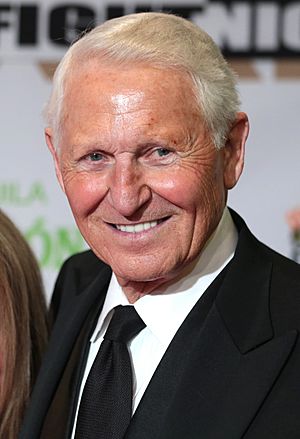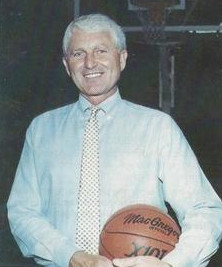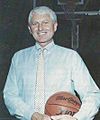Lute Olson facts for kids

Olson in 2017
|
||||||||||||||
| Biographical details | ||||||||||||||
|---|---|---|---|---|---|---|---|---|---|---|---|---|---|---|
| Born | September 22, 1934 Mayville, North Dakota, U.S. |
|||||||||||||
| Died | August 27, 2020 (aged 85) Tucson, Arizona, U.S. |
|||||||||||||
| Playing career | ||||||||||||||
| 1953–1956 | Augsburg | |||||||||||||
| Coaching career (HC unless noted) | ||||||||||||||
| 1956–1957 | Mahnomen HS | |||||||||||||
| 1957–1961 | Two Harbors HS | |||||||||||||
| 1962–1963 | Western HS (assistant) | |||||||||||||
| 1963–1964 | Loara HS | |||||||||||||
| 1964–1969 | Marina HS | |||||||||||||
| 1969–1973 | Long Beach CC | |||||||||||||
| 1973–1974 | Long Beach State | |||||||||||||
| 1974–1983 | Iowa | |||||||||||||
| 1983–2008 | Arizona | |||||||||||||
| Head coaching record | ||||||||||||||
| Overall | 781–280 (college) | |||||||||||||
| Accomplishments and honors | ||||||||||||||
| Championships | ||||||||||||||
| NCAA Division I tournament (1997) 5 NCAA Regional—Final Four (1980, 1988, 1994, 1997, 2001) PCAA regular season (1974) Big Ten regular season (1979) 11 Pac-10 regular season (1986, 1988–1991, 1993, 1994, 1998, 2000, 2003, 2005) 4 Pac-10 tournament (1988–1990, 2002) |
||||||||||||||
| Awards | ||||||||||||||
| NABC Coach of the Year (1980) Clair Bee Coach of the Year Award (2001) Big Ten Coach of the Year (1979) 7× Pac-10 Coach of the Year (1986, 1988, 1989, 1993, 1994, 1998, 2003) |
||||||||||||||
| Basketball Hall of Fame Inducted in 2002 |
||||||||||||||
| College Basketball Hall of Fame Inducted in 2006 & 2019 |
||||||||||||||
|
Medal record
|
||||||||||||||
Robert Luther "Lute" Olson (September 22, 1934 – August 27, 2020) was a famous American basketball coach. He was honored in both the Naismith Memorial Basketball Hall of Fame and the National Collegiate Basketball Hall of Fame. Olson was the head coach for the Arizona Wildcats men's team for 25 years. He also coached the Iowa Hawkeyes for nine years and Long Beach State 49ers for one season. He was known for helping players improve and for finding great new talent. Many of his former players went on to have amazing careers in the NBA. Lute Olson retired from coaching on October 23, 2008. He passed away on August 27, 2020, in Tucson, Arizona, at 85 years old.
Contents
Lute Olson's Early Life
Lute Olson was born on a farm near Mayville, North Dakota, on September 22, 1934. His family was of Norwegian-American background. When Lute was young, his father, Albert, passed away. A few months later, his older brother Amos also died in a farm accident. This led Lute's mother, Alinda, to move the family into Mayville.
Lute attended Mayville High School for three years. He then graduated from Grand Forks Central High School after his family moved again. He grew to be 6 feet 3 inches tall. In high school, Lute played basketball, football, and baseball. In 1951, he met Bobbi Russell while singing in a church choir. They became very close. In 1952, Lute led Grand Forks Central to win the state basketball championship.
After high school, Olson went to Augsburg University in Minneapolis, Minnesota. He played football, basketball, and baseball there. He graduated in 1956 with degrees in history and physical education. He also received the "Augsburg Honors Athlete Award." Lute and Bobbi got married in 1953 while he was still in college.
After college, Olson taught and coached high school basketball for 13 years. He coached in Minnesota and then in California. In 1964, he became the head coach at Marina-Huntington Beach High School.
Lute Olson's Coaching Journey
Long Beach City College (1969–1973)
In 1969, Olson became the Head Coach at Long Beach City College. He was 35 years old and had five children. He wanted to coach at the college level. Olson quickly found success, leading his teams to a 103–22 record over four seasons. They even won the 1971 Junior College Championship.
Olson was happy at Long Beach City College. He said he loved it there and recruited players only from the local area. His success caught the attention of bigger universities.
Long Beach State University (1973–1974)
In his only season at Long Beach State, Olson led the team to an amazing 24–2 record. They won their conference title without losing a single game. The team was ranked as high as #3 in the country.
However, the team was banned from the NCAA tournament. This was because of rule violations from the previous coach's time. Even so, five players from that team were drafted into the NBA. After this successful but challenging season, Olson moved on to the University of Iowa.
University of Iowa (1974–1983)
Olson coached Iowa for nine seasons, from 1974 to 1983. He had a total record of 167 wins and 91 losses. He became the school's all-time wins leader.
When Olson arrived, Iowa's basketball team had been struggling. He quickly turned the program around. In his second season, they won 19 games. Iowa then won the Big Ten Conference Title in 1979. This earned them their first of five straight trips to the NCAA Tournament.
In 1980, Olson led the Hawkeyes to the Final Four. The team faced many challenges, including key players getting injured. Despite this, they made an incredible run in the tournament. They beat top teams like North Carolina State and Syracuse. In the regional final, they came back from 14 points down to beat Georgetown by one point.
In the NCAA Semi-Final, their star player, Ronnie Lester, got injured early. Iowa lost to Louisville, who went on to win the championship. Olson believed they could have won if Lester had stayed healthy.
After the Final Four, Olson's Iowa teams made the next three NCAA Tournaments. In 1983, his final season, they reached the Sweet Sixteen. A new arena, Carver-Hawkeye Arena, which Olson had helped plan, opened in 1983. After that season, Olson left Iowa for the University of Arizona.
University of Arizona (1983–2007)
Olson surprised many by moving to Arizona. The Arizona program had just finished its worst season ever, winning only four games. Olson said he left Iowa because he needed a change.
Under Olson, Arizona quickly became a national powerhouse. In just his second year, the Wildcats had a winning season. They then made 23 straight NCAA Tournament appearances. A year later, Arizona won its first Pac-10 title. Two years after that, they spent much of the season ranked #1 and reached their first Final Four under Olson.
Olson was named Pac-10 Coach of the Year seven times. He led Arizona to five Final Four appearances. In 1997, his team won the NCAA championship. They achieved something special by beating three #1 seeded teams in that tournament.
In 2002, Olson was inducted into the Basketball Hall of Fame. He also coached the U.S. national team in the 1986 FIBA World Championship. His team won the gold medal, beating the USSR. This was the first time the U.S. had won that championship in 32 years.
Developing Talented Players at Arizona
Lute Olson was excellent at helping players grow. Many players who were not highly ranked in high school became college stars and successful NBA players under him. Some famous examples include Steve Kerr, Mike Bibby, Jason Terry, and Gilbert Arenas.
Arizona's basketball program became known as "Point Guard U." This was because of the many great point guards who played there. These included Damon Stoudamire, Kerr, Bibby, and Terry. Other talented players like Sean Elliott, Richard Jefferson, and Andre Iguodala also played for Olson. Even though fewer big players made it big in the NBA, Olson coached some notable ones like Channing Frye.
Lute Olson's Family Life
Lute Olson married Roberta "Bobbi" Russell in 1953. They were married for 47 years and had five children. Bobbi Olson passed away on January 1, 2001. The basketball court at the University of Arizona is named the Lute and Bobbi Olson Court in her honor.
Lute Olson later married Christine Jack Toretti in 2003. They later divorced in 2007. In April 2010, Olson married Kelly Fischer.
Olson's granddaughter, Julie Brase, became an assistant coach for the Phoenix Mercury in the Women's National Basketball Association (WNBA). She played basketball at the University of Arizona herself. Olson's daughter, Jody (Julie's mother), is a high school principal. His grandson, Matt Brase, also played for Arizona and later became an assistant coach for the Houston Rockets in the NBA.
Health and Retirement
In October 2008, Lute Olson announced his retirement from coaching. This came after he had been dealing with some health issues. His doctor later explained that Olson had suffered a stroke earlier that year. This stroke caused severe depression and affected his judgment. His doctor advised him to retire.
In retirement, Olson often visited the University of Iowa, which he called "a special place." He was inducted into the Iowa Athletics Hall of Fame in 2000. He attended football and basketball games and met with former players and fans. Olson also helped his former player Kenny Arnold, who faced serious health challenges.
On April 12, 2018, the University of Arizona honored Olson with a statue outside the McKale Center. Many former players and his family attended the unveiling. Olson joked, "They got the hair right." He said the honor meant the world to him. In his later years, Olson enjoyed attending Arizona basketball games and watching his former players coach in the NBA. He also played a lot more golf.
Lute Olson was hospitalized in 2019 after another stroke. He passed away on August 27, 2020, at the age of 85.
Lute Olson's Legacy
Lute Olson is remembered as one of the greatest coaches in college basketball history. He had 46 NCAA tournament wins, which is one of the highest totals ever. Olson brought new excitement and success to both the University of Iowa and the University of Arizona.
When he retired, many people praised his impact. The University of Arizona president said Olson "transformed the UA and Tucson into premier basketball country." Other coaches and sports writers also spoke highly of his achievements. They noted how he built Arizona into an incredible program from a difficult starting point.
In 2010, the Lute Olson Award was created in his honor. This award is given each year to the best Division I college basketball player in the nation. Olson was inducted into the National Collegiate Basketball Hall of Fame again in 2019, showing his lasting importance to the sport.
Coaching Achievements
Lute Olson had an amazing career with many highlights:
- He coached high school basketball for many years, with a record of 180 wins and 76 losses.
At Long Beach City College
- Named Metro Conference Coach of the Year three times (1970, 1971, 1973).
- Led LBCC to three Metro Conference titles (1970, 1971, 1973).
- Won the California Junior College State Championship in 1971.
At Long Beach State University
- Named PCAA Coach of the Year (1974).
- Named Western Region Coach of the Year (1974).
- Led Long Beach State to the Big West Championship (1974).
At the University of Iowa
- Named Big Ten Coach of the Year twice (1979, 1981).
- Led Iowa to the Big Ten Championship (1979).
- Guided Iowa to the NCAA Final Four (1980).
- Led Iowa to five straight NCAA tournament appearances, a record at the time.
- Left Iowa as the coach with the most wins in school history (168–90 record).
At the University of Arizona
- Named Pac-10 Coach of the Year seven times (1986, 1988, 1989, 1993, 1994, 1998, 2003).
- Led Arizona to 11 Pac-10 championships (1986, 1988, 1989, 1990, 1991, 1993, 1994, 1998, 2000, 2003, 2005).
- Had 20 straight seasons with 20 or more wins.
- Averaged almost 25 wins per year during his more than 20 years at Arizona.
- Holds the record for most Pac-10 wins (327) by any coach.
- Led Arizona to four NCAA Final Four appearances (1988, 1994, 1997, 2001).
- Won one NCAA Championship (1997).
- His 1997 Arizona team is the only one in NCAA history to beat three #1 seeds in the same tournament.
- Arizona's 25 straight NCAA Tournament appearances (23 under Olson) is the second longest streak ever.
Overall Career Records
- One of only 8 coaches in college history to coach in five or more Final Fours.
- One of 11 coaches who have taken two different teams to the Final Four.
- Averaged almost 23 wins per year in over 30 years of coaching.
- Had 29 winning seasons in over 30 years of coaching.
- In 34 seasons as a Division I head coach, he had a record of 781 wins and 280 losses.
Awards
- U.S. Coach, R. William Jones Cup Champions (1984).
- U.S. Coach, World Championship Gold Medal (1986).
- National Coach of the Year (1988, 1990).
- Received the Golden Plate Award from the American Academy of Achievement (2000).
- Inducted into the Pi Kappa Alpha International Fraternity (2012).
Lute Olson's Coaching Record
Junior College
| Season | Team | Overall | Conference | Standing | Postseason | ||||
|---|---|---|---|---|---|---|---|---|---|
| Long Beach City College (Metropolitan Conference) (1969–1973) | |||||||||
| 1969–70 | LBCC | 1st | |||||||
| 1970–71 | LBCC | 1st | |||||||
| 1971–72 | LBCC | ||||||||
| 1972–73 | LBCC | 1st | |||||||
| LBCC: | 103-22 | ||||||||
| Total: | 103-22 | ||||||||
|
National champion Conference regular season champion Conference tournament champion |
|||||||||
College
| Season | Team | Overall | Conference | Standing | Postseason | ||||
|---|---|---|---|---|---|---|---|---|---|
| Long Beach State 49ers (Pacific Coast Athletic Association) (1973–1974) | |||||||||
| 1973–74 | Long Beach State | 24–2 | 12–0 | 1st | |||||
| Long Beach State: | 24–2 (.923) | 12–0 (1.000) | |||||||
| Iowa Hawkeyes (Big Ten Conference) (1974–1983) | |||||||||
| 1974–75 | Iowa | 10–16 | 7–11 | 7th | |||||
| 1975–76 | Iowa | 19–10 | 9–9 | 5th | |||||
| 1976–77 | Iowa | 20–7 | 12–6 | 4th | |||||
| 1977–78 | Iowa | 12–15 | 5–13 | 8th | |||||
| 1978–79 | Iowa | 20–8 | 13–5 | 1st | NCAA Division I first round | ||||
| 1979–80 | Iowa | 23–10 | 10–8 | 4th | NCAA Division I Final Four | ||||
| 1980–81 | Iowa | 21–7 | 13–5 | 2nd | NCAA Division I first round | ||||
| 1981–82 | Iowa | 21–8 | 12–6 | 2nd | NCAA Division I second round | ||||
| 1982–83 | Iowa | 21–10 | 10–8 | T–2nd | NCAA Division I Sweet 16 | ||||
| Iowa: | 167–91 (.647) | 91–71 (.562) | |||||||
| Arizona Wildcats (Pacific-10 Conference) (1983–2008) | |||||||||
| 1983–84 | Arizona | 11–17 | 8–10 | 8th | |||||
| 1984–85 | Arizona | 21–10 | 12–6 | T–3rd | NCAA Division I first round | ||||
| 1985–86 | Arizona | 23–9 | 14–4 | 1st | NCAA Division I first round | ||||
| 1986–87 | Arizona | 18–12 | 13–5 | 2nd | NCAA Division I first round | ||||
| 1987–88 | Arizona | 35–3 | 17–1 | 1st | NCAA Division I Final Four | ||||
| 1988–89 | Arizona | 29–4 | 17–1 | 1st | NCAA Division I Sweet 16 | ||||
| 1989–90 | Arizona | 25–7 | 15–3 | T–1st | NCAA Division I second round | ||||
| 1990–91 | Arizona | 28–7 | 14–4 | 1st | NCAA Division I Sweet 16 | ||||
| 1991–92 | Arizona | 24–7 | 13–5 | 3rd | NCAA Division I first round | ||||
| 1992–93 | Arizona | 24–4 | 17–1 | 1st | NCAA Division I first round | ||||
| 1993–94 | Arizona | 29–6 | 14–4 | 1st | NCAA Division I Final Four | ||||
| 1994–95 | Arizona | 24–7 | 14–4 | 2nd | NCAA Division I first round | ||||
| 1995–96 | Arizona | 27–6 | 14–4 | 2nd | NCAA Division I Sweet 16 | ||||
| 1996–97 | Arizona | 25–9 | 11–7 | 5th | NCAA Division I champion | ||||
| 1997–98 | Arizona | 30–5 | 17–1 | 1st | NCAA Division I Elite Eight | ||||
| 1998–99 | Arizona | 22–6 | 13–5 | 2nd | NCAA Division I first round* | ||||
| 1999–00 | Arizona | 27–7 | 15–3 | T–1st | NCAA Division I second round | ||||
| 2000–01 | Arizona | 28–8 | 15–3 | 2nd | NCAA Division I Runner-up | ||||
| 2001–02 | Arizona | 24–10 | 12–6 | T–2nd | NCAA Division I Sweet 16 | ||||
| 2002–03 | Arizona | 28–4 | 17–1 | 1st | NCAA Division I Elite Eight | ||||
| 2003–04 | Arizona | 20–10 | 11–7 | 3rd | NCAA Division I first round | ||||
| 2004–05 | Arizona | 30–7 | 15–3 | 1st | NCAA Division I Elite Eight | ||||
| 2005–06 | Arizona | 20–13 | 11–7 | T–4th | NCAA Division I second round | ||||
| 2006–07 | Arizona | 20–11 | 11–7 | T–3rd | NCAA Division I first round | ||||
| Arizona: | 589–187 (.759) | 327–101 (.764) | |||||||
| Total: | 780–280 (.736) | ||||||||
|
National champion Conference regular season champion Conference tournament champion |
|||||||||
* Vacated 1 NCAA tournament loss
Images for kids
See also
 In Spanish: Lute Olson para niños
In Spanish: Lute Olson para niños
- FIBA Basketball World Cup winning head coaches
- List of college men's basketball coaches with 600 wins
- List of NCAA Division I Men's Final Four appearances by coach
 | Kyle Baker |
 | Joseph Yoakum |
 | Laura Wheeler Waring |
 | Henry Ossawa Tanner |




